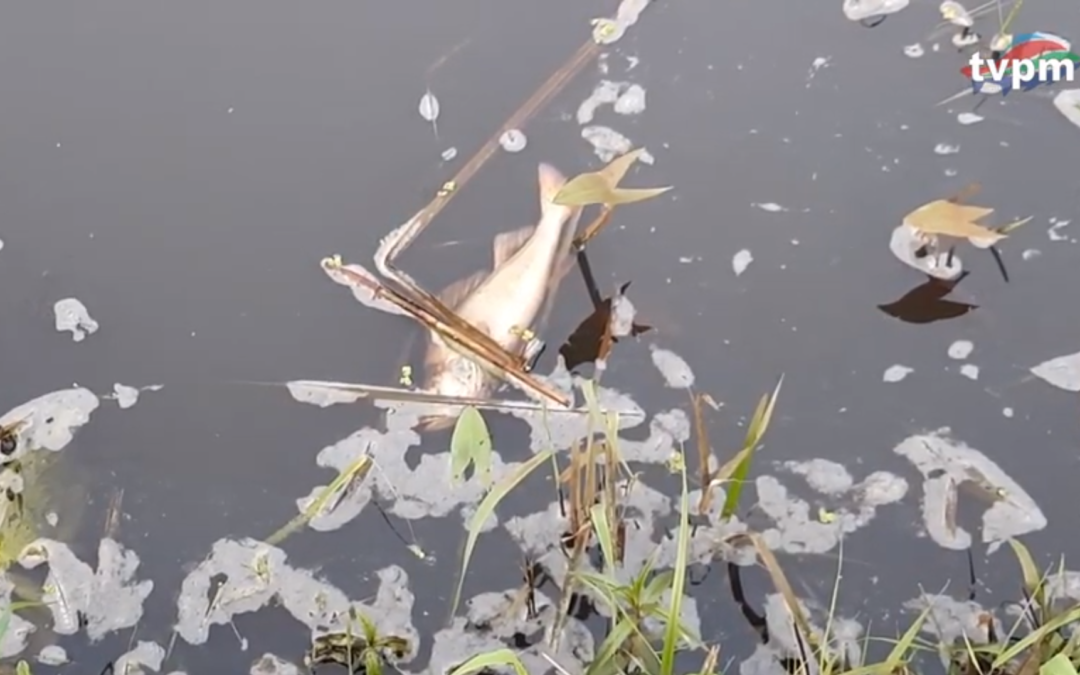Severe pollution has appeared along a 60-kilometre stretch of Poland’s Barycz River running close to five nature reserves. The water has turned black and smelt of rotten matter, with scores of dead fish and other animals reported.
The cause of the contamination remains unconfirmed, though it is possible that recent heavy rainfall washed manure into the water. Left-wing politicians have criticised the delayed response of the environmental authorities, saying that earlier action could have contained the pollution.
Zatruta została Barycz. Tlenu już w rzece nie ma, jest martwa. I co? I nic. Rządowe „Wody Polskie” się schowały. Dlaczego?Bo wybory.Dramat. pic.twitter.com/RsnYPbOmkO
— Bartek Ciążyński (@BartekCiazynski) July 7, 2020
Barycz is a river in the western provinces of Greater Poland and Lower Silesia. It is surrounded by the Barycz Valley Landscape Park, home to five nature reserves, protected bird species, and one of the largest fish pond complexes in Europe, Stawy Milickie.
Local fishermen first reported changes in the river at the start of July, when they noticed the water had turned black and smelt of rotten matter.
Measurements taken by the Provincial Inspectorate for Environmental Protection (WIOŚ) in Wrocław confirmed that the issue was not caused by chemicals, but that low levels of oxygen were present along with a high concentration of organic and ammonium nitrogen.
The contamination had also spread across a significant area, with local residents reporting dead fish, frogs and rats floating in the river.
“Barycz is a dead river today,” Sławomir Strzelecki, a local official in Milicz, a town through which the river runs, told Gazeta Wyborcza. “And probably all the fish in many ponds which draw water from it will also be wiped out.”
‼️ Zanieczyszczenie rzeki Barycz ‼️W środę 1 lipca pracownicy spółki Stawy Milickie SA odkryli, że doszło do…
Opublikowany przez Stawy Milickie SA Piątek, 3 lipca 2020
According to news website OKO.press, all tributaries were immediately closed to prevent further damage as soon as the pollution had been reported. The Crisis Management Centre (CZK) has also assured residents that they have “done everything” they can to protect the environment.
“All possible weirs have been opened so that the river cleans itself as it flows,” Konstancja Jeziorska from the centre told TVN24. “All pond culverts have been closed so that no pollution can get in – although we already know that it has been able to get into some ponds.”
However, some MPs have criticised the speed of the response by the environmental authorities, and appealed for urgent intervention from the national government.
“The ecological threat exceeds the scope and possibilities of local self-government intervention,” argued left-wing MP Agnieszka Dziemianowicz-Bąk in a press release. “The environment ministry should coordinate the activities.”
Małgorzata Tracz, an MP and co-leader of the Greens, said she had spoken to the mayor of Milicz about the “alarming” situation.
“The ecological disaster occurred at the turn of June and July, while state institutions do nothing,” said Trzacz. “Local governments were not allowed to manage rivers, including the Barycz – this is managed by Wody Polskie [the state body managing Poland’s waters], which has not taken any action for over a week.”
The mayor of Milicz, Piotr Lech, has alleged that he has struggled to contact Wody Polskie and regional water management authorities, telling TVN24 that he has since commissioned private testing of the water.
However, in an online statement, Wody Polskie said that they have “monitored the situation on the river every day since the beginning [of the crisis]”. They went on to assure that the nature reserve and pond complex are safe and the areas managed by the company remain open to tourists.
In a statement issued today, the environment ministry reassured that they undertook “urgent intervention immediately after detecting the event”, adding that “recent measurement results as well as a direct examination of the Barycz river confirm that the situation is slowly improving”.
The ministry added that the “oxygen conditions, aeration and water transparency are improving. Live fry can be observed in the river”.
Efforts are still ongoing to discover the cause of the pollution. Jakub Kaczmarek, from the Provincial Inspectorate for Environmental Protection in Poznań, said that the conditions may have been caused by recent heavy rainfall washing manure into the water. This suggestion has also been put forward by the Wrocław branch of Wody Polskie.
However, Kaczmarek admitted to TVN24 that “the scale of the pollution also suggests other causes that we have not yet discovered.” He added that the inspectorate had also flown a drone over the area in an attempt to locate the source.
According to local media reports quoted in OKO,press, other sources of pollution under consideration include wastewater from a local piggery, or a leak from the sewage treatment plant in Odolanów.
But the mayor of Odolanów, Marian Janicki, has strenuously denied this possibility, saying that the plant was “modern” and had “no way to pollute the river.” He also encouraged residents and farmers to collect their piles of manure from fields.
The pollution in the Barycz River follows another major environmental disaster in Poland last year. In August, the Czajka sewage treatment plant in Warsaw malfunctioned, sending thousands of litres of sewage into the Vistula.
A technical failure at a sewage facility in Warsaw has resulted in 3 cubic metres per second of raw sewage currently flowing into the Vistula River. Drinking water in the city, which comes from upstream, isn't affected but it could be in places downstream https://t.co/m3qiiUOdXI
— Notes from Poland 🇵🇱 (@notesfrompoland) August 28, 2019
Main image credit: tvpmilicz/YouTube

Juliette Bretan is a freelance journalist covering Polish and Eastern European current affairs and culture. Her work has featured on the BBC World Service, and in CityMetric, The Independent, Ozy, New Eastern Europe and Culture.pl.




















